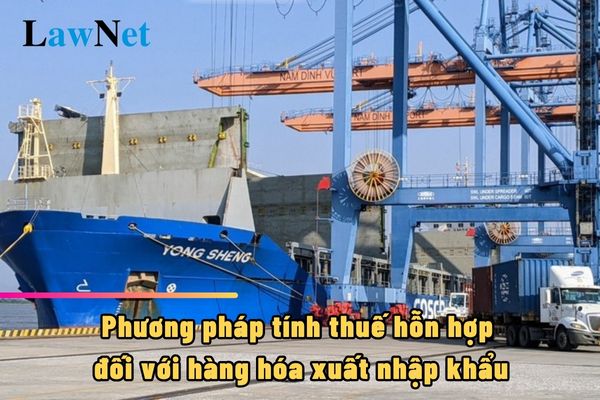What is the calculation method for mixed duty for exports and imports in Vietnam?
What is the calculation method for mixed duty for exports and imports in Vietnam?
Based on Clause 2, Article 4 Law on Export and Import duties 2016, it is regulated as follows:
Terminology explanation
In this Law, the terms below are understood as follows:
1. The duty-free zone is an economic area within Vietnam's territory, established according to the provisions of law, with defined geographical boundaries separated from external areas by hard fences, ensuring conditions for inspection, supervision, and customs control activities by customs agencies and related agencies on exports and imports, vehicles, passengers on entry and exit. The buying and selling relationship between the duty-free zone and the outside is the export-import relationship.
2. The mixed duty calculation method is the simultaneous application of the percentage-based duty calculation method and the absolute duty calculation method.
...
Thus, in accordance with the above regulations, the mixed duty calculation method for exports and imports is the simultaneous application of the percentage-based duty calculation method and the absolute duty calculation method.

What is the mixed duty calculation method for exports and imports in Vietnam? (Image from Internet)
What are the duty bases for exports and imports using the mixed duty calculation method in Vietnam?
Based on Article 6 Law on Export and Import duties 2016, the duty bases for exports and imports using the mixed duty calculation method are as follows:
- The duty amount applying the absolute duty calculation method for exports and imports is determined based on the actual quantity of goods exported, imported, and the absolute duty rate per unit of goods at the time of duty calculation.
- The duty amount applying the mixed duty calculation method for exports and imports is determined as the total duty amount calculated as a percentage and the absolute duty amount specified in Clause 1, Article 5 Law on Export and Import duties 2016 and Clause 1, Article 6 Law on Export and Import duties 2016.
Thus, the duty bases for exports and imports using the mixed duty calculation method will be determined as the total duty amount calculated as a percentage and the absolute duty amount.
Do transited goods have to pay export-import duty?
Based on Article 2 Law on Export and Import duties 2016, the subjects of duty are as follows:
- Goods exported, imported through Vietnam's border gates and borders.
- Goods exported from the domestic market into duty-free zones, goods imported from duty-free zones into the domestic market.
- Goods exported, imported on the spot and goods exported, imported by enterprises carrying out the right to export, import, and distribute.
- The subjects of export and import duty do not apply to the following cases:
+ Transited, transshipped, and transited goods;
+ Humanitarian aid goods, non-refundable aid goods;
+ Goods exported from duty-free zones to foreign countries; imported goods from foreign countries into duty-free zones and used only within duty-free zones; goods transferred from one duty-free zone to another duty-free zone;
+ Oil and gas used to pay natural resource duties to the State when exported.
What are the regulations on export-import taxpayers in Vietnam?
Based on Article 3 Law on Export and Import duties 2016, it is as follows:
- Owners of exports and imports.
- Organizations authorized for export, import.
- Persons exiting or entering with exports and imports, sending or receiving goods through Vietnam's border gates and borders.
- Persons authorized, guaranteed, and paying duties on behalf of taxpayers, including:
+ Customs procedure agents in the case of being authorized by the dutypayer to pay export, import duty;
+ Enterprises providing postal services and international express delivery services in the case of paying duties on behalf of the dutypayer;
+ Credit institutions or other organizations operating under the Law on Credit Institutions in the case of guaranteeing and paying duties on behalf of taxpayers;
+ Persons authorized by the goods owner in the case of goods being gifts of individuals; luggage sent before or after the trip of persons exiting or entering;
+ Branches of enterprises authorized to pay duties on behalf of enterprises;
+ Other persons authorized to pay duties on behalf of taxpayers according to the provisions of law.
- Persons purchasing, transporting goods within the duty exemption quota of border residents but do not use them for production and consumption, selling them in the domestic market, and foreign traders allowed to conduct export and import business in border markets according to the provisions of law.
- Persons who have exports and imports that are subject to no duty, duty exemption but later changed to subjected to duty according to the provisions of law.
- Other cases as prescribed by law.

